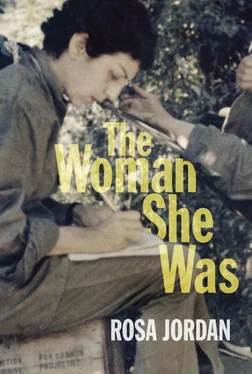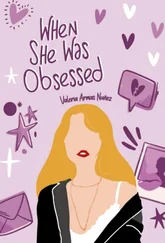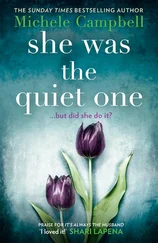“So what if I’m afraid?” Liliana blubbered. “Who wants to live where kids carry guns to school to shoot classmates they hate and grownups go around blowing up—”
“Goddammit, Liliana! You don’t judge a whole country by its lunatic fringe!”
“I know! I’m crazy! But they’re crazier! They tried to kill us!”
“No!” José yelled. “We were just there. In the way!”
“Enough!” Alma admonished José. “Can’t you see she’s upset?”
As if Alma’s diagnosis gave Liliana permission to abandon the calm she had maintained through the crisis, she suddenly and completely fell apart.
“Don’t you get it?” she shrieked. “Tía Alma went off to show that security guy what toilet those perverts were in and there was the explosion and stuff falling all around us and I thought my whole family was blown up!”
Celia’s arms closed around her. “It’s okay, Preciosa. We are all here.”
Luis said, “I don’t see a doorman, José. Shall we go get the cars?”
Walking toward the parking lot, Luis placed an arm across Joe’s shoulder. Joe could never remember him making such a gesture before, but somehow it felt right. For the first time in his life, he was glad to have a brother.
CELIA, wet-haired from the shower, was cold. Rather than go to her own bed, she got in with Liliana, who had showered first and was already asleep. Liliana slept soundly in the way of exhausted children and did not stir when Celia lay down beside her.
Celia was exhausted too, but the adrenalin in her system had not abated. After a while she got up and headed for the kitchen to make herself a cup of cocoa. As she passed the telephone on the table at the end of the sofa, it rang. She picked it up. “Hola?”
Joaquín’s hysterical voice came over the line. “Celia! Oh my God, is it really you? I can’t believe—tell me it’s you!”
“Calmate,” Celia soothed. “It is me and I am okay. We all are.”
“Luis said you were going to the Mundo Nuevo for dinner! The dining room—I’m looking at it now, on TV! So many injured!”
“I know. But we were on the far side. We were not—”
Joaquín was sobbing. “Let him go to trial. Burn in hell! But if you had been hurt I would have killed him with my bare hands! Oh, but they got him. This is a miracle!”
To Celia, it sounded more like a total mental breakdown. “Joaquín,” she said sharply. “What are you talking about? Got who?”
“Luis Posada Carriles! Don’t you have the TV on? Turn it on, for God’s sake!”
Celia started toward the set, holding the telephone to her ear. But the cord was not long enough to reach, so she stood where she was, listening to Joaquín.
“Look, they’re showing his picture now! It’s him for sure!”
“You mean the man they captured, the older one?” Celia, although staring at a blank television screen, dredged up an image of Luis Posada Carriles from a photograph that had appeared in Granma at the time he claimed credit for the bombing of other Habana hotels back in 1997.
“See? For sure it’s him!”
She could not speak.
“Celia? Celia! Are you there?”
“I’m here,” she whispered. “Are they actually saying the older one is Posada?”
“Not yet.” Joaquín admitted. “But you can tell! Look at the eyes! That’s something that never changes!”
“What about the other man, the younger one?”
“A Salvadoran, like those who helped him before. He’ll be convicted same as they were. But Posada, the old devil, he always got away. Not this time, though!”
Celia’s hands were shaking, causing her to wonder at the unpredictability of her own body. She had remained steady through all that had happened, but now this—a fragment of unsubstantiated news—made her tremble. She felt as if she had fallen through the roof of her own nightmare into a place she never expected to be: a world where the spectre of her fathers’ killers, still on the loose, no longer haunted her.
“Thank you, Joaquín,” she finally managed to say. “When I get back from México we will get together. We will celebrate. Now let’s just… watch the news.”
However, when she hung up Celia did not turn on the television. She went into the kitchen and with unsteady hands, made the cocoa. How ironic it would have been if the man responsible for killing her father had, over a quarter-century later and by purest chance, succeeded in murdering his only surviving daughter and granddaughter.
If Liliana had not seen the shoes, if she had been standing at the mirror as she normally was in any ladies’ room, smiling at her own reflection, and then… no more. Would there have been any way to go on? Celia could imagine Liliana’s absence; she had lived the anguish of that absence not very long ago. More recently she had tried to come to terms with the possibility of losing Liliana in the sense of being physically cut off from her should she decide to stay in Florida. That had seemed intolerable, something she was not at all sure she could bear. But to imagine Liliana out of existence, that she could not do. Easier by far to imagine that she herself had been killed. For what was there, after all, to imagine? Just—the end. The nothing thereafter.
She thought of how her father and her sister had died in explosions half a world apart, and how her mother and Celia Sánchez, both of whom had been in the middle of a war for two years or longer with grenades, gunfire, mortars, and bombs exploding all around them, had not been scratched. They were survivors. She was a survivor.
With that thought came another one: I am the woman they were.
The cocoa was suddenly boiling. She poured it into a mug, returned to the living room, and sat down in a rocker. The room was dark except for moonlight spilling in through the balcony door. The cocoa was too hot to drink but it comforted her to wrap cold fingers around the warm cup and breathe in the sweet steam rising from it.
Directly in front of her was the television screen, empty except for a faint reflection of the white terrycloth robe that had opened to reveal her crossed legs. What she saw in that reflection, though, was a different pair of legs, much thinner than her own, but which, like hers, had a glint of gold about the ankle.
She was a ten-year-old child, sitting on the floor, waiting impatiently for the cocoa that had been placed on the coffee table in front of her to cool. She was not really listening to the conversation between Celia and her mother, would not remember it afterwards. Yet she must have heard what they said; how else could she be hearing it now?
“Dying is overrated,” Celia Sánchez was saying. “A momentary thing, like giving birth or getting married. It’s the afterwards that counts, if there is one. In the case of death, I strongly suspect there isn’t. Not one we would recognize anyway.”
“Ah, Celia, you are so brave.” Her mother began to cry. “You always were.”
“Katrina,” Celia Sánchez spoke sharply. “You asked how I am. I am telling you. But don’t burden me with your feelings—not at this point.” She turned to the child on the floor and said, “How is the cocoa? Too hot, yes?”
“Sí, Compañera Celia,” the girl replied. She was pleased to have been noticed by the lady with the very thin legs, so elegantly crossed at the knees. Then, shyly, “I like your anklet. Is it a present from Fidel?”
Celia Sánchez smiled and instead of answering the question, asked, “What is it you plan to do with your life, my little namesake?”
“Uh, be a doctor,” the child replied quickly, knowing this answer would please the adults.
Читать дальше












